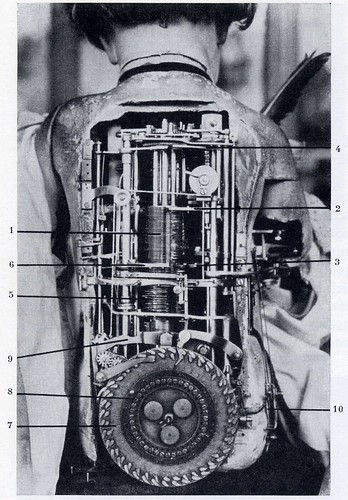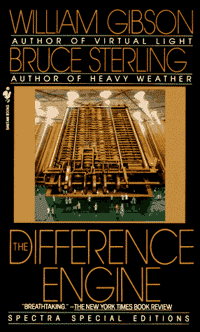Allana: To segue awkwardly back into this book we're supposed to be discussing, things aren't really very risque yet. Not that either of these authors are known for their gratuity.
Bill: I think a big part of the transgressive draw of cyberpunk as a genre was the notion of blending your organic body with a machine... I kind of alternate between superpower fantasy and deathwish, where you sort of willingly surrender your meat to the meatless future of thought that you are building. I'm not sure if there is equivalent transgression to be found in the steam-driven tech in this book. Though there was that bit in the beginning... let me quote... "These hands consist of tendons, tissue, jointed bone. Through quiet processes of time and information, threads within the human cells have woven themselves into a woman." This comes right along with the reference to the Jaquard loom cloth. I get the sense that what is being suggested is a mechanizing of the concept of life itself, at this early era... that human beings are seen as the products of a card-programmed inhuman loom.
This picture of an automaton linked to from sethgoldstein's Flickr photostream.
Allana: I did a presentation in a philosophy class once about the precursors to the cognitive science movement; people who referred to bodies as machines that could be explained and predicted. We called them the non-self theories, the idea that the human thought process and existence doesn't rely on a soul or any mysterious ephemeral substance. De La Mettrie, who I think was writing in the 1700s, wrote a book called Man A Machine - although his arguments were more like "You know how men who eat lots of red meat seem angry and loud all the time? And you know how people who drink a lot sometimes sound drunk even when they're sober?" But, still, he was the first to come right out and say it, which was pretty outrageous in non-secular society. Hume got nailed for it, too; there's a small passage in A Treatise of Human Nature which goes something like "I can never capture that thing within me that could exist past my own thought; I try to get to the basis of my ideas but it's not something that can be grasped, past the feed of my senses being mixed with my memories." I'm not really going anywhere with this, though; it's more of an info-dump. And a naive hope that somewhere in this story we meet some Man-A-Machine fanatics that hold up placards and shout slogans about how people should embrace their computer-ness.
Bill: It's been a theme in science fiction pretty strongly played since Neuromancer... there's an understanding in neuropsychology currently that consciousness itself isn't actually in charge, that your brain is a machine for reacting to stimuli and your conscious awareness is only an observer of those reactions that then quickly confabulates excuses for why you wanted to do what you did... but those excuses come after the action, even though we fool ourselves into believing we made deliberate choices based on those reasons. That you are just a passenger in yourself, with no access to the steering wheel. Books by Peter Watts hit this idea pretty hard. You could point to Darwin, who is also name dropped in the Difference Engine as one of the "Rad Lords", as the big-bang moment of this thread of understanding being introduced in the loom of modern knowledge. I guess the only thing the book itself suggest so far is that this line of thought might be much earlier adopted by those in power if the advent of computing were pushed back to the Victorian era. I'm not sure if there have been any radically strong stances taken in the book yet.
Allana: Not yet, but we can hope.
Bill: Maybe seeds planted for something more radical to come.
Allana: Fingers crossed! And more death scenes too plz.
Bill: You should write a book that is all death scenes.
Allana: Uh, Roberto Bolano did; it's called 2666.
Bill: Ha! Haven't read 2666 yet, but it's on the shelf behind me.
Allana: It's just the third part that's brutal; the rest is pretty good.
Bill: Are we calling the chat closed now?
Allana: I think that would be prudent.
Bill: Thanks for chatting - catch you again soon!
Allana: Awesome. Doctor Who time.
Typogram I Transmission Finis
Typogram I.IV - Products of a Card-Programmed Inhuman Loom
Written by Bill on Wednesday, April 07, 2010
Subscribe to:
Post Comments (Atom)




No comments:
Post a Comment